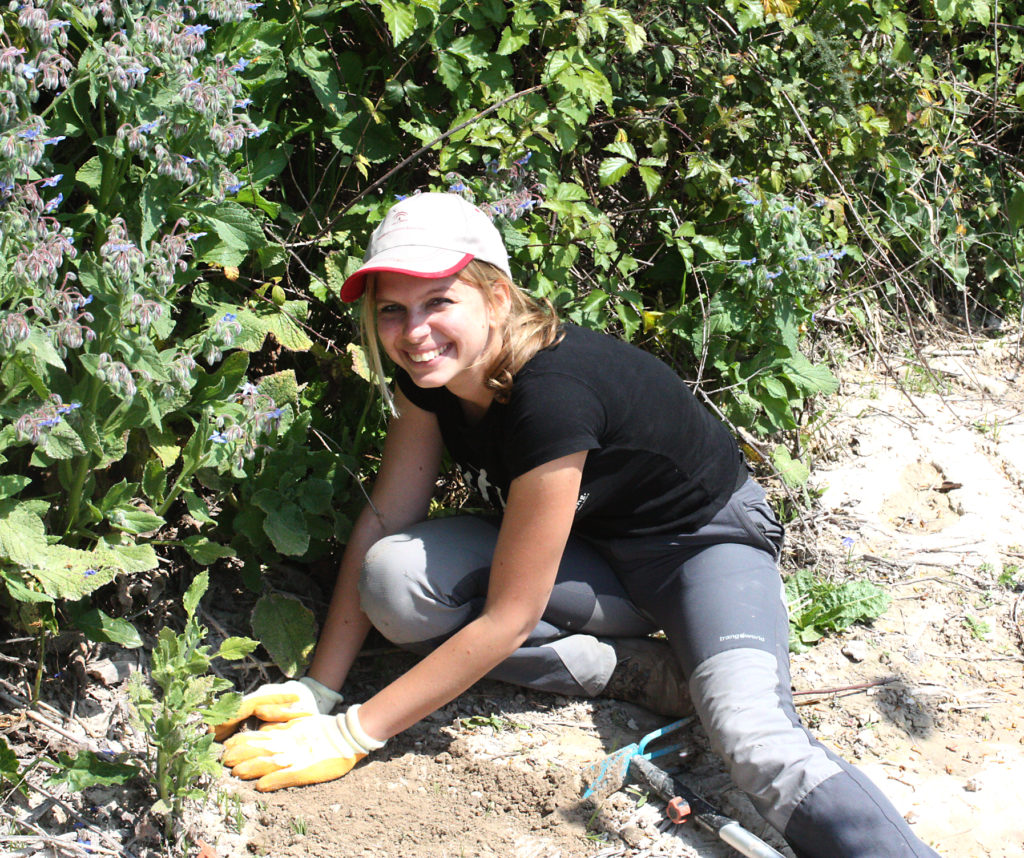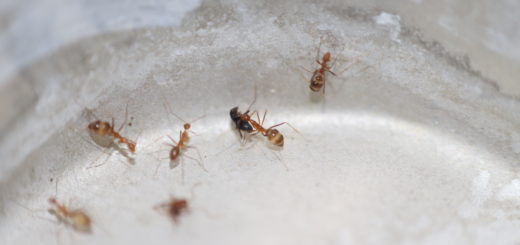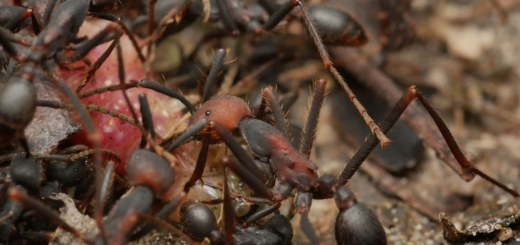Doing an ant PostDoc: Cléo Bertelsmeier

Cléo Bertelsmeier is 31 years old and from Germany; she has studied biology at the University of Oxford (UK), and she did her PhD on impacts of climate change on ant invasions in Paris (France). She did a first postdoc on modelling historical bird distributions in Adelaide (Australia), and now she is finishing her PostDoc in Lausanne (Switzerland). But this PostDoc will be the last stage in the globalized movement for now, as she has been offered a tenure-track professorship in ecology at the University of Lausanne.
An Interview compiled by Patrick Krapf 
MNB: What is the topic of your PostDoc project?
CB: The impacts of globalization on the worldwide spread of ants.
MNB: In which year of your PostDoc studies are you now?
CB: I am in 4th year.
MNB: Why ants?
CB: I fell in love with ants after writing an undergraduate dissertation about division of labor in ants and reading Laurent Keller’s book “The lives of ants.”
MNB: How do you feel about field work?
CB: Love it, but I don’t do it very often.
MNB: … about identifying ants using a key?
CB: I need a key to identify most ants, unfortunately.
MNB: … working in the wet lab?
CB: Never worked in a wet lab, most of my work happens on a computer.

Aspirating ants at the Southwestern Research station during at Ant Course. (© Cléo Bertelsmeier)
MNB: Have you been involved in any of the -omics approaches, and what was your experience?
CB: No.
MNB: Did you acquire your statistics knowledge in university courses, from your supervisor, or on your own?
CB: I have followed a good basic statistics course during my undergraduate studies, but from then it was mostly self-taught learning, interactions with statisticians, or specialized workshops.
MNB: What is the ideal frequency of meeting your supervisor for discussing your research from your point of view: daily, weekly, monthly?
CB: Irregularly. I do not like to have scheduled meetings with my boss – I very much prefer to turn up if I have something to discuss or new results to show. Fortunately, my postdoc advisor also prefers this.
MNB: Do you like discussing ideas or problems with fellow PhD/PostDoc students?
CB: I think it is one of the best sources of new ideas and support. In Lausanne, we are lucky to have three groups working on ants in the department, so there always around 20 people to discuss ideas or problems with.
MNB: How many papers do you read in an average week?
CB: Around 10.
MNB: In an ideal world, is the working group you belong to small or large?
CB: Both can have advantages and disadvantages. I love my current group (lead by Laurent Keller) with many people from many different nationalities working on a diversity of topics ranging from genomics to behavior. Smaller groups can be better for closer supervision.
MNB: And ideally, is your uni close to your field-work site or in an urban area?
CB: I am lucky to work in Lausanne, which is a nice vibrant little city very close to the mountains and the Lake Geneva.

Field experiments with Argentine ants in Southern Spain. (© Cléo Bertelsmeier)
MNB: Have you profited more from attending conferences with narrower or with broader scope?
CB: I like medium-size conferences, so that you can run into people that you want to meet by accident instead of chasing them down for five days.
MNB: What is most relevant to you at a conference: attending talks, giving a talk, meeting senior scientists, meeting other students?
CB: Meeting people, both students and senior scientists.
MNB: Did you ever participate in a science slam and if so, would you do it again?
CB: I have never done that.
MNB: If you would get 100,000 Dollar to spend for your research project, what would you do with it?
CB: I would like to do a collaborative project with biostatisticians and economists to better understand global flows of introduced ant species and how to predict future invasions arising from emergent economies.
MNB: What helps you best in your spare time to relax from work?
CB: Social activities with friends (cooking dinner, going out) and mountain sports (skiing, hiking, and climbing).
MNB: How do you celebrate successes like getting a paper accepted, a proposal granted, or the like?
CB: 1. Jump around and scream. 2. Find my lab friends and have some celebratory drinks.
MNB: What is your personal trick to get over periods of low(er) motivation?
CB: I do something fun with friends when I am not in a mood to be very productive. Some relaxation and sport is necessary to get over lower motivation.
MNB: What is the one thing you would do differently when starting your PhD thesis again?
CB: Seek out more collaborators who are experts on different sub-parts of the project early on in the PhD. I think it is highly beneficial to get input and feedback from different people with different backgrounds.
MNB: Would you like to stay in science?
CB: Yes.

Making some space in the lab to host new ant colonies. (© Cléo Bertelsmeier)
MNB: If you will be supervising PhD students yourself one day, what will be the most important thing you will expect from your students?
CB: Creativity, scientific integrity, and critical thinking. I would like them to explore many hypotheses with a fresh mind and challenge common assumptions including those hold by their advisor.
MNB: … and what will be the most important thing you will want to take care of in supervising?
CB: I would like to avoid common frustrations and conflicts in the supervisor-student relationship by taking care of regular communication and an open-minded lab culture that encourages collaboration. I would also like students to take full ownership of their projects and make their thesis their own “baby”.
MNB: Original article or review article?
CB: Original article.
MNB: Reading or writing?
CB: Reading.
MNB: Writing or reviewing?
CB: Writing.
MNB: Table or figure?
CB: Figure.
MNB: Web of Science or Google Scholar?
CB: Web of Science.
MNB: Windows, OS, or Linux?
CB: OS.
MNB: Command-line or graphical-user interface?
CB: Command line.
MNB: Mouse or touchpad?
CB: Mouse.
MNB: Facebook or Twitter?
CB: Twitter.
MNB: Bus or bike?
CB: Foot!
MNB: Sun or rain?
CB: Thunderstorms.
MNB: Diploid or haploid?
CB: Haplodiploid.
MNB: Sting or acid?
CB: Sting.
MNB: Social parasite or host?
CB: Social parasite.
MNB: Your favourite ant?
CB: Trap-jaw ants.
MNB: Thank you for this interview!





Recent Comments